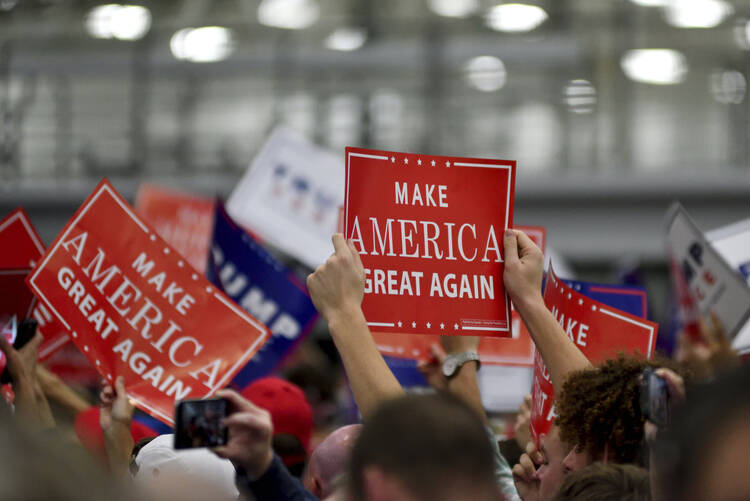God willing, on Nov. 9, this election will be over. For the last 18 months, our country has been immersed in the unholy political discourse of the 2016 campaign. We have seen and heard things we never thought we would see or hear as part of an election, and we have had to explain things to our children that should never be part of childhood. Nightly cable TV preoccupations with lies about emails and vulgarities about women have sucked all the oxygen out of primetime, suffocating the coverage of humanitarian catastrophes in Syria and on the Mediterranean Sea.
No matter which candidate becomes our next president, an extraordinarily divided nation will be challenged to move forward under seriously flawed leadership. This begs the question: On the morning after, what kind of country will we be? Will the supporters of the winning candidate be validated and affirmed in their "otherization" of the opposition? Will the supporters of the losing candidate believe they were cheated by a rigged system, crystallizing their anger and suspicion? Will this country remain politically separated by generation, gender, sexuality, race, religion, income, ethnicity, education, geographic location and party affiliation?
It is tempting to think that on the Wednesday after the election our long national nightmare will be over, but the 2016 campaign is only a symptom, not the disease. The affliction is an uncompromising, fractured culture, buttressed by righteous indignation and the justification of any means toward a worthy end. For months we have heard “It’s all about the Supreme Court justices” and “It’s a binary choice,” but there has been little to no talk of collaboration, accommodation or establishing common ground.
As recently as 1994, according to studies done by the Pew Research Center, 23 percent of Republicans were more liberal than the median Democrat and 17 percent of Democrats were more conservative than the median Republican. By 2014, however, the areas of agreement between the parties had nearly disappeared. Only 4 percent of Republicans were more liberal than the median Democrat, and only 5 percent of Democrats were more conservative than the median Republican.
The last two years suggest nothing but a further erosion of common ground, and we continue to reduce the state of our union to a thousand points of "right." We are barricaded within our separate conceptions of what is good and true and threatened by the potential for goodness and truth in the ideologies of others. We live separately and experience life separately because, in 2016, we can. Instead of testing and refining our personal perspectives in the fire of the ideas and experiences of others, we mitigate the stresses of daily life within echo chambers that confirm our own ideologies with the comfortable and compatible thoughts of the like-minded.
Presidential politics are rarely celebrated for integrity or brilliance, but this year's campaigns have established a new benchmark for division and darkness. What our country needs now is unity and light. We need purification, regeneration and renewal. We need hope and a new beginning. What we need is a small-b baptism, a collective re-creation and initiation into a new culture of both/and, rejecting the uncompromising and fractured culture of either/or. The elite, the deplorable, the out-of-work, the employer, the convicts, the victims of crime, the devout and the “nones”—we need to talk with and listen to each other. We need to rise up from the darkness of separateness as a new creature, one community of many members, working toward a functional and constructive pluralism.
Eight hundred years ago, a Persian poet and theologian dreamt of such a place:
When the soul lies down in that grass
Can we possibly achieve what Rumi imagined? I hope so, because the world is so full, and there is so much to be done—none of which can be accomplished by small segments of a society. Honoring the dignity of the full spectrum of human life—not only of the unborn but of the poor, the displaced, the disabled, the aging and the condemned—requires collaboration. Care for our common home challenges all of us to make accommodations, and progress toward peace in our families, our neighborhoods and every corner of the globe means finding common ground.
On Nov. 9, I pray the good Lord sees fit to re-create our country. May we emerge from this election united in the light of a new beginning, renewed and ready to meet each other in the grass of a field, out beyond ideas of wrong and right.
Lisa Middendorf Woodall has been the coordinator of religious education at John Paul II Catholic School in Cincinnati since 2009. She expects to receieve a master’s degree in theology at Xavier University this year.








